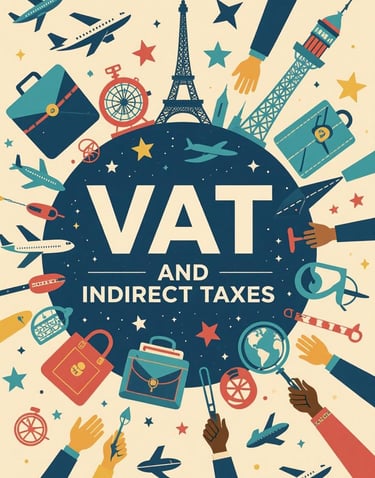
Indirect Tax Risks for Travel Agents and OTAs
VAT is more than reclaim rules. Travel agents and OTAs face hidden VAT liabilities when selling packages, earning commissions, or misclassifying contracts. Learn how to protect your margins.
TRAVEL & HOSPITALITY FINANCE
9/20/20254 min read


Indirect Tax Risks for Travel Agents and OTAs: Beyond EU VAT Reclaim
This article is adapted from Antravia Research – Tax Architecture in Travel: VAT, Transfer Pricing, and the Exposure of Global Business Models. It provides general information for travel agents and hospitality businesses. It is not tax advice. For guidance specific to your situation, you should consult a qualified tax advisor.
When travel businesses think about VAT, the first question is often: “Can I get a refund?” That’s where reclaim rules come in, and we’ve covered that in detail in our EU VAT Reclaim blog. But reclaim is only part the story. The bigger risk for agents, OTAs, and DMCs is the VAT you may owe when you’re selling. This is where margins can disappear if you get it wrong.
Why you need to think about VAT exposure
A common misconception among U.S. and non-EU agents is that VAT only applies if you open an office in Europe. In reality, many countries require non-resident suppliers to register and charge VAT when selling services locally, particularly if the customer is an individual. A U.S. advisor packaging and selling a French itinerary may face a VAT obligation in France, even without a French entity.
Where the risks show up
Selling packages: Bundling accommodation and excursions in Europe often triggers local VAT registration.
Relying on reverse charge: Reverse charge only works if the buyer is correctly classified as a business and the service qualifies. Hotels and excursions usually don’t. Misclassification leaves you with unrecoverable VAT.
Commissions: Some foreign hotels and DMCs may deduct VAT at source from commissions, reducing what you’re paid. Without a local VAT number, there may be no way to reclaim it. Note 1
Europe’s special rules: TOMS and the Package Travel Directive
Europe adds another layer of complexity with the Tour Operators Margin Scheme (TOMS). Under TOMS, VAT is calculated on your margin, not total sales. Input VAT on those costs may often not recoverable. This catches out new entrants who assume VAT is neutral. TOMS applies exclusively to EU-established tour operators and agents reselling travel within the EU; non-EU entities are generally excluded and must instead register for VAT in each relevant member state, charging full VAT on supplies rather than margins. This creates a competitive disadvantage for non-EU operators, as noted in ongoing EU consultations for reform.
The EU Package Travel Directive also matters. It may require bundled services to be treated as a single package, which can shift a sale from B2B to B2C. Authorities increasingly look at substance over form - if you set pricing and take risk, you may be treated as the supplier regardless of what your contract says. The Directive (2015/2302) defines "packages" for consumer protection and organizer liability but does not directly dictate VAT classifications like B2B vs. B2C shifts; it indirectly influences VAT treatment by emphasizing substance (e.g., who bears risk and sets terms) over contractual form, potentially reclassifying agents as principals for tax purposes in audits. However, VAT classification remains governed by the VAT Directive, not PTD, and recent 2025 amendments focus more on traveler protections than tax implication
Why this matters for profitability
VAT rates across Europe range from 17% to 27% (with several around 18/19/20%). If you misclassify or fail to register, it might be a compliance problem a lost margin. Many DMCs and OTAs only discover this after an audit, when it’s too late to fix.
What you can do about it
Check your contracts: Make sure it’s clear if you’re acting as principal or agent.
Don’t rely on assumptions: Reverse charge doesn’t apply everywhere.
Invest in systems: Automated tools can flag when VAT registration is needed and reduce reclaim errors.
Plan for the future: Digital Services Taxes are a concern, and OECD reforms will reshape how consumer-facing travel businesses are taxed globally. While DSTs remain a risk for digital-heavy OTAs, they are not actively spreading in 2025 due to OECD/G20 agreements to pause or repeal them pending Pillar One implementation; many jurisdictions (e.g., in Europe) have suspended new DSTs. OECD Pillar One (reallocating taxing rights for large multinationals, including digital firms) has stalled, with only Amount B (transfer pricing simplification) advancing, and its impact on travel is limited unless the business exceeds global revenue thresholds (~€750M).
Conclusion
Reclaiming VAT is important, but preventing hidden VAT liabilities is even more critical. For travel sellers, VAT isn’t just a back-office issue. It’s central to how you price, how you contract, and whether your margins hold up under scrutiny.
At Antravia, we help agents, OTAs, and hotels navigate VAT exposure so they can sell globally with confidence.
See our specialist pages
Global VAT Reclaim - Recover the Tax you’ve already paid abroad
UK VAT Reclaim for U.S. and Global Businesses
EU VAT Reclaim for U.S. and Global Businesses
UAE VAT Reclaim for U.S. and Global Businesses
International VAT Reclaim


Note 1:
Commissions: Some foreign hotels and DMCs deduct VAT at source from commissions, reducing what you’re paid. Without a local VAT number, there’s no way to reclaim it. While some EU suppliers may apply withholding taxes or adjust payments for non-residents under local rules, hotels and DMCs typically do not deduct VAT from commissions paid to non-EU agents because the agent's service (e.g., booking facilitation) is subject to reverse charge at the supplier's location and the hotel/DMC self-assesses the VAT without withholding it from the payment. Reclaimability depends on the agent's registration status, but non-EU agents often receive commissions net of any withholding without VAT deduction, as the transaction falls outside the supplier's VAT charging obligation.


Disclaimer:
Content published by Antravia is provided for informational purposes only and reflects research, industry analysis, and our professional perspective. It does not constitute legal, tax, or accounting advice. Regulations vary by jurisdiction, and individual circumstances differ. Readers should seek advice from a qualified professional before making decisions that could affect their business.
Antravia Advisory
Where Travel Meets Smart Finance
Email:
Contact us:
Antravia LLC
© 2025. All rights reserved. | Disclaimer | Privacy Policy | Terms of Use | Accessibility Statement
Antravia.com - Global site of the Antravia Group.
Antravia.com | Antravia.co.uk | Antravia.ae |
Finance.travel | Tax.travel | Consultancy.travel | VAT.travel | VAT.claims |
USSales.tax | EuroVAT.tax | UKVAT.tax |
contact@antravia.com
Antravia LLC
4539 N 22nd St., Ste. N
Phoenix
Arizona
85016
